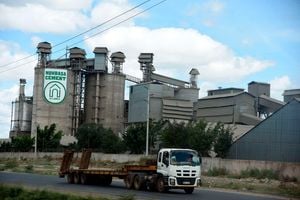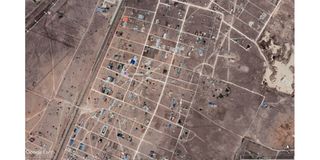
This is a Google Earth satellite image showing part of the settled section at the East African Portland Cement property in Mavoko in 2022. This was a year before demolitions in October 2023.
The property from which hundreds of families were brutally evicted in October 2023 is currently lying idle with some sections occupied by wildlife, Nation.Africa has established.
The East Africa Portland Cement Company (EAPCC) land in Mavoko sub-County was a hot topic last year as ruthless machinery roared about while tearing down every last erect structure. In the end, many investors who had thought they had found land close to the city saw their hopes and investments sink into a pile of debris amid a cloud of dust.
A year later, we looked for some of the victims of the demolition and their anguish is still fresh. We found a lady who delivered a baby early due to mental distress.
In other cases, some people who thought they would no longer be paying rent are now struggling to live as tenants. Some have lost friends whom they invited there, not knowing the fate that awaited them.
Hasty demolitions
This is even as the area MP questions why demolitions had to be conducted hastily, only for the land to lie unused.
The days in 2023 between Friday, October 13, and Sunday, October 22 brought untold anguish and despair to at least 300 families who resided in the property. In 10 days, heavy bulldozers – backed by heavy police presence – rolled and destroyed palatial homes, shops, schools, entertainment joints and churches as the owners watched helplessly.
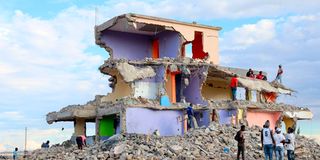
A demolished house that had been built on Portland Cement land in Mavoko, Machakos County, on October 17, 2023.
The Aimi Ma Lukenya (AML) Association, which had claimed the ownership of 4,298 acres of land there, had been embroiled in a fierce court battle with the Portland management in a Machakos court.
On October 9, four days before the demolitions, the court declared EAPCC the legal owner of the disputed land.
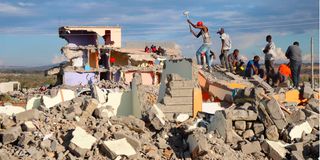
Demolished houses that were built on Portland Cement land in Mavoko, Machakos County, on October 17, 2023.
After the demolition, scrap metals and other building materials were scavenged in a few days and trenches were dug by Portland management in several entry points to avert any further encroachment.
However, a few months later, unscrupulous local traders began illegally excavating murram and dumping cotton soil from the Kitengela and Athi River areas. They were cashing in on the need for those building houses elsewhere to dispose of the soil they dig up. However, this did not go on for long as the Portland management stopped them and deployed security officers to protect the coveted land.
At a recent spot-check, Nation found a virtually deserted land, covered by shrubs and knee-high grass.
A herd of antelopes from the nearby Kapiti plains rested under a shrub for a shade from the scorching sun.
'No-go zone'
One year after the demolition there were no signs of any human settlements previously on the land.
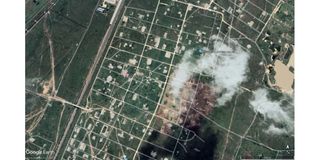
A Google Earth satellite image showing part of the settled section at the East African Portland Cement property in Mavoko in 2024 following demolitions that happened in October 2023.
An EAPCC security team patrolling the land was at the ready to repulse any intruders.
“This land is a no-go zone to members of the public. We are manning the land round the clock to avert encroachment. The land belongs to EAPCC,” said one of the officers patrolling the land.
Recently, Portland’s acting managing director, Mr Mohamed Osman, said that the firm is moving away from holding large tracts of land that not only attract squatters but also wealthy well-connected land grabbers.
“We want to de-risk from holding expansive properties with a high risk of being encroached on. We want to realise exit value and invest in putting up a new integrated plant in Athi River capable of growing production,” he said.
The firebrand Mavoko MP Patrick Makau said there were speculative reasons behind the demolitions.
“How could the government have demolished homes for dozens of locals only for the land to remain idle?” wondered the third-term MP.
“After demolitions, citizens expected to see developments done on the very land. [There is] no single development so far but exploitation. This leads to thinking that it was a malicious demolition guided by prospects,” he said.
Recently, during the impeachment motion against Deputy President Rigathi Gachagua in the National Assembly, Mr Makau, a Wiper party MP, supported the impeachment motion contrary to his party position.
“I went to him seeking help to stop demolition but he dismissed me in the most cavalier manner. It’s my time to take revenge for the Mavoko people,” he said in a public forum a few days before Mr Gachagua was impeached.
On the floor of the assembly during the impeachment proceedings, Mr Gachagua was faulted for protecting traders in Nairobi’s Muthurwa market against eviction but not doing the same for the Mavoko residents.
EAPCC is seeking to sell land worth Sh15.6 billion in Athi River as a short-term measure to turn around the giant cement processor.
Apart from the regularisation of its part of 907 acres, EAPCC has earmarked 13 plots of 50 acres for sale to the Kenya Wildlife Service for wildlife migratory corridor.
The company is in the process of actualising the deed of settlement between itself and the government to surrender a property measuring 4,272 acres valued at Sh25 billion earmarked for affordable housing. A further 1,000 acres has been earmarked for gazettement as an export promotion zone.
The migratory corridor, affordable housing and export promotion zone land falls under the land that various buyers had occupied before the October 2023 demolition.
Below are stories of 13 buyers and how they are coping, a year on.
Jacinta Mathoka, 50
Jacinta is a single mother of two children and has one granddaughter. At the invitation of a relative, she bought a parcel in the affected area in 2018 from a man who was dealing with a broker, who is now deceased. “I paid Sh400,000 plus a transfer fee of Sh30,000,” she says.
She later built a two-bedroom house with a toilet outside. With the demolition, she lost about Sh3 million.
“I am still struggling because it was my retirement home,” she says. She currently lives in Kitengela. One year later, she says it does not sit right with her that she is now paying rent. “I can’t believe that up to date, I am staying in a rented house when I had my own.
It’s very hard to cope with the situation. When I remember [my ordeal], I cry every day; something I would not like to happen even to my worst enemy,” she says, as she wonders why the government left out room for negotiations.
One of the lessons she has learnt is never to pay for land without a legitimate title deed. She also has a question to ask: “Where did the leaders who used to sell the land go?”
Whitney Mbithe
In 2017, Whitney committed Sh330,000 to buying a 50-by-100-feet property in the disputed area. By the time the demolitions came, she had a four-bedroomed house and stalls for selling food and vegetables. “I suffered a loss of Sh7 million,” she says.
She had also brought along a friend who “invested immensely” before all came crumbling down. She is now being blamed for causing the friend’s loss. The past year has been hell for her and her family of six.
“It hasn’t been easy for my young family. So far, we have shifted houses three times and we have not yet settled because the house we are currently in is a two-bedroom [that is too] small for my family. Secondly, I suffered depression which led to emergency CS [Caesarean Section] before term.” She wonders why there was no notice and why there was a rush to evict them.
“Is there a way they can settle us?” she wonders. One of the lessons she has learnt, she says, is never to bank on what politicians say. “I can never trust any promise from any politician during the campaign period,” says Whitney, who is in her thirties.
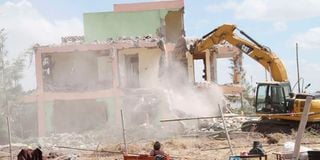
A bulldozer flattening a house in East African Portland Land in Mavoko on October 14, 2023.
David Kivuva, 50
With a family of five, Mr Kivuva was an optimistic man in 2014 when he bought a 100-by-100-feet parcel of land and later built two houses — a bungalow for his family and a flat that he rented out. When the demolitions happened, he was set apart many steps.
“Per my estimate, I lost over Sh9 million,” he says. He had also invited friends and relatives to the site. They keep blaming him for leading them to this money-burning venture.
A year later, he says he is adapting to a life he was not used to. “My life changed completely. I started paying rent, changed schools [for my children].
It is a miserable life,” he says. He is confident that he did all his due diligence and so he wonders if he and other victims can get back their land. “My request is that President Ruto considers victims of the Mavoko demolition,” he says.
Wilkister Nyangate, 42
She ventured into the Mavoko property in 2019, where she built a family house, a shop and a water supply point. She also invited her two brothers and an aunt to invest there. When the bulldozers came calling, she lost almost Sh3 million. One year later, Wilkister – who has a family of three – is in turmoil. “I am struggling, but I’ve put God first in everything,” she says.
“As the major victim of the Mavoko demolition, I am really demoralised about life. Even moving forward is a problem. I am asking if the government can give us a legitimate place to and to build us even a two-roomed house to help me carry on with life,” she says.
Zahra Rajab, 62
Zahra ventured into the property in 2016, buying a parcel of land on which she built a private residence. “I had a farm and a borehole which sold water to neighbours,” she recalls.
The demolitions came out of the blue, and she approximates that she lost assets worth Sh30 million.
A year later, she says she is not okay. “I am deeply depressed, living with relatives when I had a home of my own. My businesses are failing; too many to mention,” she says.
She had brought some close people to the property, and she is glad that they do not blame her for the loss.
“We’re still on good terms, luckily,” she says. Her question to the authorities is: “How do they live with themselves after ruining so many lives?” The lesson she has picked from the ordeal is that even with a genuine title deed, one needs to still “follow through to know all about the root of its origin”.
Japheth Lumwagi, 37
A driver, Japheth bought two plots measuring 40 by 80 feet in 2020. “I bought it from Komarock Ranching and Housing under Aimi ma Lukenya,” says Japheth, who heads a family of five.
He was putting up a two-bedroom house when the demolitions happened, and he says there was no warning. He had also brought a friend who bought some land. In the end, he says, he lost about Sh520,000. “I am depressed because I suffered a big loss,” he says.
“Why conduct demolitions without any notice and without compensation?... We should just be compensated.” The biggest lesson he has learnt from the experience is that he can “never just buy land anyhow”.
Paul Kithinzi, 43
The father of three thought he had taken a significant leap in his life when he bought property in the affected area from Aimi ma Lukenya Society in 2020. He was underway with the construction when the demolition happened last year, and with that Sh900,000 went down the drain. “It has been a terrible year,” he says.
“Why demolish a building most likely to set up [another] building?” He has no kind words for President William Ruto’s government: “We have a government that does not care about its citizens.” He adds: “Was it the best option? Why the rush yet no development on the property one year later?”
Daniel Kimanzi
He had invested in a 40-by-80-feet property in the area, and he was building a one-bedroomed house there that was “reduced to debris in a span of two minutes”. An asset he had purchased after shedding blood, sweat, and tears was gone in one fell swoop. Also affected were his mother, his two sisters and his cousin.
“It beats logic how land searches and the title deed from the very government stated that the land belonged to Aimi ma Lukenya after succession from East Africa Portland Cement. The same government orchestrated this atrocity on us for two good weeks,” he adds.
Ezekiel Ndetto
Ezekiel first bought a piece of land at the site in 2015 and bought another in 2020. Married with five children, he bought four plots and built eight rooms, two latrines and two bathrooms. When the sudden demolition happened, he was caught flat-footed. He says he lost a fully stocked hardware and houses worth Sh10 million.
One year later, how is he coping with the loss? “[I have] a lot of problems,” he says, adding that there are people who still owe him for the stock they had taken and had not paid for it. He sees the hand of “cartels with the government” in the demolitions.
David Wamalwa, 35
He bought a 40-by-100 plot on the site in 2020 from Aimi ma Lukenya, spending Sh550,000 in the process. By the time the demolitions were happening, he had built a maisonette and was living there. The loss was immense for him and his family of four. “We were left with a loan of Sh8 million that we are paying but we have nothing to show for,” he told the Nation.
One year later, he said, he is living “hand-to-mouth” as he handles the debts he has. He has many questions.
“Where was the government when all the structures were erected? What plans do they have for the victims? Why did they not give notice and give them a chance to buy that land since they demolished and now they are selling the same parcel?
Why did Portland demolish my house?” he wonders. Asked what lessons he has picked from the ordeal, he answers: “Don’t ever buy land without a title deed. [Don’t] ever vote in a president who lacks the idea of running a country.” He says the mental toll of the demolitions lasts to date.
“We have families and most went into depression. Nobody tried to reach us and even say sorry,” says Mr Wamalwa.
Mary Nyamai, 38
A mother of four, Mary bought a plot in the area in 2015 from one of the officials of Aimi ma Lukenya. She then built a three-bedroom house where she was staying with her family. The demolitions turned her life upside down.
“It was a traumatising experience that I cannot wish anyone to pass through. To date, I have not yet recovered,” she says. To make matters worse, she is being blamed by her relatives for inviting them there.
“I introduced my brother and my niece to purchase plots there, which they did. To date, they are blaming me for losing money,” adds Mary. She says she lost about Sh3 million and she is still repaying the loan that she spent on putting up the house. A year later, she is having it rough.
“It’s not easy at all. My friend gave me a place to build a temporary structure to stay. It’s so hard because sometimes we lack food. I also lack school fees for my children. Life has become so hard for me,” she says.
Her questions to the government are: “Why did the government of Kenya do this to its own citizens? And what did they gain by demolishing my home?” She adds: “I plead with the government to have mercy on us and give us back or sell the plots to us again so that we can have where we can call home again.”
Adiema Victor, 42
Mr Adiema bought three-quarters of an acre at the site in 2018, where he built a private residential house. With a family of five, he was confident that a roof over his kin’s head was no longer a bother. He was wrong, very wrong.
The demolitions set him back at least Sh4.5 million, and there were more losses by friends and relatives who invested there.
Taking stock of the past year, he terms his experience “Tough and depressing.” He poses: “Why be so inhuman? Isn’t the government supposed to protect its citizens? Why were we not offered the alternative to purchase the land afresh?” he is convinced that the government elite do not care for the ordinary folk.
Evans Ondonga, 50
With a family of four, Mr Ondonga set sail at the property in 2014. He saw an opportunity to make money and so he built 10 rental houses and also had a three-bedroom abode. With the demolitions, he says he lost almost Sh5 million. He wonders if the government can allocate him another property.



